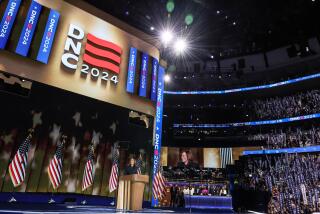He’s Not One in Name, but Democrats Sure Like Mike
BOSTON — If Michael Moore was hot before, he’s now on fire.
In his filmmaking career, Moore has evolved from agitator to celebrity. But since the release last month of “Fahrenheit 9/11,” his critique of President Bush’s actions before, during and after the Sept. 11 terrorist attacks, Moore has adopted a new persona: sought-after political commentator at the Democratic National Convention.
From the moment Moore stepped foot on the convention floor, he was pursued for appearances on ABC’s “Good Morning America” and “Nightline,” CNN’s “Larry King Live” and “The O’Reilly Factor” on the Fox News Channel.
His appearances before groups of union members and liberal activists roiled audiences with the fervor of political rallies and rock concerts.
Today, Moore heads into potentially hostile territory, traveling to Crawford, Texas -- the closest town to Bush’s 1,600-acre ranch -- for a screening of his latest and most controversial film. He has invited the president to attend. The White House said it was unlikely that Bush would do so.
If the Republican Party once dismissed Moore’s cinematic critique of Bush as unlikely to influence the presidential race, “they now realize this is going to be a huge headache for them,” Moore said. “This election could very possibly be decided by a very small margin. The movie has already convinced that 3% or 4% to change their minds.”
“Democrats who have come up to me at the convention say it has had an enormous impact,” Moore said, trudging to an interview with Ted Koppel of “Nightline” in his habitual baggy sweatshirt, jeans and baseball cap.
Whatever the effect of his film -- the 9% of the electorate who have seen it are overwhelmingly Democrats, according to the latest Times poll -- Moore made it clear that he was focused on influencing the outcome.
“If I can make a small contribution to backing up a U-Haul truck to the White House and moving Bush out, I will feel I have made a contribution,” he said.
Moore said he had not planned to attend the convention, and showed up only to accept an award from the Congressional Black Caucus. He said he was not a registered Democrat and had not endorsed -- or even spoken to -- the party’s presumed nominee, Sen. John F. Kerry, whom he described as “a guy who would never do what George Bush did: start a war without an imminent threat.”
Republicans have seized on Moore’s presence in Boston, hoping to tie him to Kerry in their quest to paint Democrats as extreme and out of the mainstream.
“We had Michael Moore in the presidential box,” said Sen. Norm Coleman (R-Minn.) during a news conference at the temporary Republican headquarters a block from the FleetCenter. “Michael Moore sits with Jimmy Carter in the presidential box. Is that the foreign policy that’s going to come out of the convention?”
When Moore wandered onto the convention floor Monday afternoon, a mob of cameramen and reporters descended on him for 2 1/2 hours, ignoring such party luminaries as Madeleine Albright, secretary of State in the Clinton administration. At an appearance before liberal activists at a hotel in nearby Cambridge, fire marshals had to turn people away.
“You’re the rock star of the DNC,” a “Good Morning America” producer told him after he met with union supporters in Brookline. “You’re like Springsteen.”
At a news conference after his Brookline appearance, Moore called Bush a “hatriot.”
“Anyone who would want to deny to two consenting adults a life of love and companionship, that is an act of hate,” he said. “When you cut after-school programs, that is an act of hate. These people have hijacked the word ‘patriotism.’ I want it back, and I think the majority of Americans want it back.”
Even people who didn’t agree with everything Moore had to say said they found him provocative.
“He’s a very gutsy guy, and he opens up the dialogue, which is very much needed,” said Nancy Wohlforth, an official of an office employees union, after his Cambridge appearance.
More to Read
Get the L.A. Times Politics newsletter
Deeply reported insights into legislation, politics and policy from Sacramento, Washington and beyond. In your inbox three times per week.
You may occasionally receive promotional content from the Los Angeles Times.










